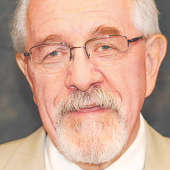- Christmas shopping is done, presents wrapped, strings attached? (12/14/16)
- Cecil is dead and human lives are threatened every day (8/12/15)
- As state flags go, Nebraska's ranks 50th (7/8/15)
- When everything looks like a nail (4/29/15)
- Who remembers to coal slurry pipeline debate? (3/11/15)
- More revelations in Department of Corrections mess (12/17/14)
- The Legislature becomes more Republican (11/19/14)
Opinion
Nebraska's dubious achievement award: The filibuster
Wednesday, April 17, 2013
Sixty percent of the allotted time for the legislative session has elapsed and lawmakers are talking about talking too much.
Veteran lawmaker Ernie Chambers has launched three filibusters (talking an issue to death) and promised others. Sen. Scott Lautenbaugh of Omaha recently burned 45 minutes of time explaining to his colleagues why they need to get the lead out -- and then apologized for taking that much time. Speaker of the Legislature Greg Adams of York adjusted the daily schedule to include early to late evening floor debate much sooner than speakers have in the past.
As of the end of Day 55 (April 5) of the 90-day session, lawmakers had passed and the governor signed 72 bills. Another 36 have been killed, seven withdrawn. Seven measures are awaiting the third and final round before approval. Senators, committees and the Speaker have tabbed 104 bills as priorities. In regular years, those priority measures would have been the fodder for the rest of the session which must also see the drafting and approval of a two-year budget document.
But, Lautenbaugh pointed out, this isn't a regular year. His Omaha colleague Bob Krist complained that this has been the slowest session of the five he has experienced. Lobbyists and observers of the process agree. Some say it's the return of the 75-year-old Chambers who sat out his mandatory four years as the result of term limits. So far this session he has prolonged debate on measures dealing with: betting on historic horse races; using work camp prisoners as volunteers with non-profit agencies; and a proposed study of Nebraska taxes.
The National Conference of State Legislatures in Denver says filibusters are rare in state Legislatures -- except Nebraska's. Filibusters can be cut off with a simple majority of lawmaker votes in most states. "You pretty much never or hardly ever see them," Brenda Erickson, program principal for NCSL. "Most have limited session lengths, so you cannot afford to have truly unlimited debate."
Sen. Bill Avery of Lincoln said Chambers can do a one-man filibuster by "clever use" of the rules -- moving to reconsider a previous motion or amendment or bracket the bill. Each move allows Chambers to speak three times, each time for five minutes. Avery says there are all kinds of rules you can use to delay, and people have to yield you time, and you have to be able to do it without a bathroom break.
Back in 1992, the Legislature adopted Senate Rule 7.10, which allows for motions for cloture (to end debate) to be approved by a two-thirds majority (33 votes), so long as the speaker decides the bill has gotten a "full and fair debate."
That used to be a tool that favored Republicans who once held 33 seats in the officially non-partisan Unicameral. The party lost three seats in the November election, dropping to 30. The number of Democrats increased by two to 17, and the number of Independents increased from one to two (including Chambers).
Colleagues, lobbyists and observers admit that Chambers plays the rules book like a piano. But repeated attempts to lower the number of votes necessary for cloture have failed and the body still allows unlimited amendments and therefore allows individual lawmakers to wield a lot of influence. Erickson said it's up to lawmakers and the speaker to enforce the rules and limit filibusters. She admits that the traditional attitude in the one-house Legislature appears to favor maximizing free and open debate.
In Ernie's absence, the most recent filibuster was last year on an expanded gambling issue.
Interestingly, other lawmakers have used the filibuster to make a point. In the '80s, Omaha Sen. Marge Higgins launched a pre-lunch filibuster on an idea that would help her cause of nursing homes and care for senior citizens.
Many lawmakers left the floor and returned to their offices to catch up on work, but a few stayed around and yielded their time to their colleague so she could make her point. Things returned to normal after lunch.
Likewise, Sen. Lorraine Langford of Kearney launched a filibuster during the dinner hour toward the end of the session in an attempt to stop a funding bill that would provide for completion of the murals on the 18th floor of the Capitol. Most of her colleagues adjourned to the Senate Lounge to dine on lobbyist-provided dinner fare while Langford raged on about the Tri-Lateral Commission and her desire to remove the United Nations from United States soil. The bill ultimately advanced.
Sen. Jennie Roback of Columbus staged a similar dinner-hour filibuster on a bill dealing with women's rights and read to her colleagues from a book while many of them also excused themselves for dinner or a card game in the second-floor offices of a then-popular longtime Omaha Senator, not Chambers.
All-in-all, dubious achievements at best.

